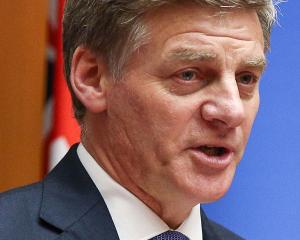The first is supremely confident, assertive, decisive; a straight talker. He leaves listeners in no doubt he will do what he is says he will. He is not afraid to state categorically where Labour should stand on any matter, with bold declarations refreshingly free of conditionality. He has busted Labour out of its self-tailored straitjacket of trying to be all things to all people, a strategy that satisfies no-one.
If breaking Labour free from its shackles and thrusting it leftwards has upset some people, so be it.
This Mr Cunliffe has been not so much a breath of fresh air, but a veritable gale of enlightenment who has refilled Labour's ideological sails and got the party moving forward again with a fair degree of unity. Labour is starting to believe in itself once more. And that should worry National.
Then there is the other version who is slightly too brash, decisive-sounding but whose statements, when subject to scrutiny leave the listener none the wiser as to what he thinks and where he actually stands. This is the professional politician who either refuses to or cannot give a straight answer. The former persona could be Mr Cunliffe's making as a leader of real stature. That persona must prevail if he is going to have a show of beating John Key next year. The latter persona threatens to be his undoing, leaving the public with the impression that, beneath the surface gloss, he is just another politician, albeit a very clever one.
The first Mr Cunliffe was much in evidence at a public meeting at Victoria University on Wednesday where he was asked to articulate his vision for Labour. In his half-hour address, he talked about ensuring the wealthy paid their fair share of tax, saying the burden was falling disproportionately on middle-income earners. He announced that a government he led would conduct a major review of the law covering trusts and other tax-avoidance mechanisms - ''no ifs, no buts, no maybes''.
Wednesday's on-campus performance contrasted markedly from his speech in Parliament the previous day during the final reading on the legislation approving the contract between the Government and SkyCity which will result in the latter building an international-standard convention centre in Auckland in exchange for an extension of the company's casino licence and more gaming machines and tables.
Here Mr Cunliffe has fallen prey to a plethora of ifs, buts and maybes. The proposed convention centre is an extremely ticklish problem for his party.
The caucus is clearly split between those MPs who want to take a moral stand on the social cost of gambling and those who see the project as an example of the kind of job-creating investment Labour should welcome with open arms.
To complicate things, the Greens are hovering in the background promising to rip up the contract, upping the pressure on Labour to do likewise.
Labour already has its work cut out convincing the electorate that the party would be a responsible manager of the economy without being lumbered with the perception that it might ride roughshod over a contract - and could without paying compensation.
Although the agreement between the Government and SkyCity is a one-off and unlikely to be replicated, Labour's opponents would paint any reneging on the deal as scaring off foreign investors and revealing Labour to be a poor economic manager.
However, the Labour leader seems to want to have it all ways. He told Parliament that Labour - if the party won power - would not ''dynamite'' a half-built convention centre. Neither would Labour rip up the contract .
Yet, Labour reserved the right to review the contract, particularly gaming table numbers. That would still break the contract. However, Mr Cunliffe said Labour was not guaranteeing compensation.
The abiding impression from Mr Cunliffe's remarks both inside and outside Parliament is that he is talking tough on the SkyCity deal before next year's election, but is also hinting that when push comes to shove, Labour would abide by the contract or demand cosmetic changes at most.
Watching all this unfold, the Greens are heartened by what they see as a tougher stance on Mr Cunliffe' s part even though it seems he does not intend holding himself to it. Whether they can force him to scotch the whole agreement if the two parties are in coalition simply depends on how much leverage voters give the Greens. Tearing up the contract will be on the coalition negotiating table, but will not be a bottom-line issue for the Greens.
There is another reason why Mr Cunliffe is talking tough on the convention centre agreement.
Part of his overall strategy is to try to paint Mr Key as someone who is only concerned with looking after the interests of National's big business mates and leaving those on middle incomes downwards to fend for themselves.
Mr Cunliffe is trying to develop an ''us-versus-them'' them mentality in voters' minds which he hopes will ultimately turn middle New Zealand against Mr Key and National. To stoke that fire, Mr Cunliffe has sought to remind people of Mr Key's close contacts with SkyCity prior to that and other companies bidding for the contract.
In Parliament, Mr Cunliffe referred to the ''wide boys in their alligator shoes ''from ''the big end of town'' getting preferential treatment from National. It is colourful language.
But the voters can see the quandary that the convention centre poses for Labour. It is a choice between jobs and stimulating the Auckland economy or sitting on the moral high ground and feeling good about yourself. It is not difficult to determine what the best option is for Labour.
Rather than playing games with semantics, the politically wise thing to do would be for Labour to express its unhappiness with the SkyCity deal, but accept it is a fait accompli. That would be what the first Mr Cunliffe would do. Is the second version listening?
- John Armstrong is the political correspondent for The New Zealand Herald.




